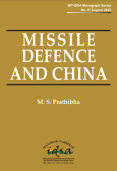Factoring the RCEP and the TPP: China, India and the Politics of Regional Integration
The Regional Comprehensive Economic Partnership (RCEP) and the Trans-Pacific Partnership (TPP) are not necessarily two contending trade liberalising models, but their import and arrival have posed stiff political challenges for many countries, including China and India, Asia’s two heavyweights. With these two initiatives, the regional trade of Asia is entering an interesting phase of liberalisation and integration.
- Jagannath P. Panda
- January 2014











